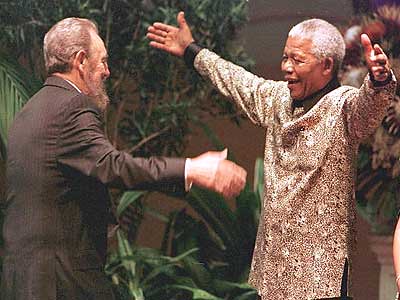
Commandante Fidel Castro greets President Nelson Mandela of South Africa when the socialist leader addressed the South African parliament in the late 1990s., a photo by Pan-African News Wire File Photos on Flickr.
Nelson Mandela And Cuba: Late South African President Was A Friend To Fidel Castro
By Staff Reporter, Dec 05, 2013 04:55 PM EST
Los Angeles Times
Nelson Mandela, the South African anti-apartheid leader and former president whose death on Thursday at age 95 provoked an outpouring of grief from around the world, had since his time in office transformed into something of an icon admired by people from across the political spectrum. But among at least one national community -- Cubans and its enormous exile community -- Mandela proved to be a slightly more divisive of a figure for his enthusiastic embrace of Cuba's Fidel Castro and the government he led. "Cuba is our second home," Mandela's wife, Winnie, once said while the couple toured downtown Havana. "We feel we have always belonged here."
Mandela had said that during his 27-year imprisonment, the writings of Che Guevara -- the Communist guerrilla leader and later Minister of Industry and head of Cuba's National Bank who died in battle in Bolivia -- served as inspiration to him. He also cited the Cuban army's war in Angola in the 1970s and 1980s, where they resisted invading South African forces, as having been a great help the anti-apartheid cause. Then there was the even more direct military support: in the early '60s, Castro supplied the militant wing of the African National Congress with arms.
Not long after international lobbying helped secure Mandela's release from jail in 1990 after 27 years, Castro invited him to Cuba. During Mandela's visit to the United States soon afterward, the city of Miami -- home of nearly a million Cuban exiles -- refused to extend an official welcome to the new deputy president of the African National Congress, a decision inspired by remarks in which he said Castro was a "brother-in-arms." Five of the region's Cuban-American mayors, including Miami mayor Xavier Suarez, signed a declaration criticizing Mandela for not denouncing human rights violations in Cuba. Newspapers carried advertisements asking Mandela to reconsider his statements of solidarity, and small airplanes trailed banners with protest messages.
One demonstrator at the time told the Chicago Tribune it wasn't "a black-white thing", adding "We don't have anything against Mr. Mandela. We only object to his support for Castro. For 31 years Castro has been doing the same thing to Cubans as the South African Government has done to blacks.'' Another was less conciliatory, saying, "He shouldn't have come here. He knew he wasn't welcome. If he supports communism, his place is back in Africa, in prison." Mandela made no mention then of the demonstrations.
In 1991, while on a turn around Latin America to urge other nations not to lift sanctions against South Africa's still-white-minority government after the United States acted to end them, Mandela made a visit to the Caribbean island nation. While noting that his African National Congress was "not a communist party," he called then-president Castro's Revolution "a source of inspiration to all freedom-loving people".
"We admire the sacrifices of the Cuban people in maintaining their independence and sovereignty in the face of a vicious, imperialist-orchestrated campaign," he told crowds at a rally where he received the Jose Marti Award, Cuba's highest honor. "We, too, want to control our own destiny."
No comments:
Post a Comment